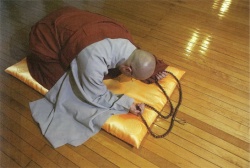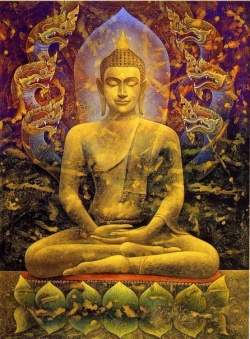Truth and Consequences What Is Karma, Anyway?
Truth and Consequences. What Is Karma, Anyway?
Q: I keep hearing the word "karma" these days. Does it mean destiny?
Lama: Karma is an ancient Sanskrit word that means causation, cause and effect, conditioning, or action and reaction.
In Tibetan, the word for karma is "leh," which literally means action.
In ancient Pali, the language of the earliest Buddhist texts, the word for karma is kamma, which means deeds.
I define karma as reaction, or conditioning.
The idea is that there are no accidents, that everything happens for a reason, even if that reason is not immediately perceptible.
All major spiritual traditions rest on the understanding that the universe has a moral dimension, and some sense of virtue and evil.
The law of karma teaches us that we create virtue or evil, and that we can and do direct our own lives and outcomes--consciously, unconsciously or, as is usually the case, semi-consciously.
Karma, in other words, is not mere luck. I
t is a mistake to imagine that one's karma is somehow fated, scripted, or predestined; that we have a fixed future, or that we should feel helpless in the face of karma, somehow imprisoned or victimized by it.
"Buddha's teaching is that you are your own master," the Dalai Lama has said.
"Everything depends on yourself. This means that pleasure and pain arise from virtuous and nonvirtuous actions which come not from outside but from within yourself."
What Buddhists call the universal law of karmic causation reveals that the steering wheel of karma--or character or destiny--is in our own hands.
And although we cannot control the karmic winds blowing from the past--"winds" such as psychological and biological conditioning--we can learn how to better adjust our sails and direct our course through life rather than being blown before the winds of past karma like a dead leaf in the wind.
According to the Shambhala Dictionary of Buddhism and Zen, " Karma provides the situation, not the response to the situation."
Where does our karma come from? From past actions and intentions.
Each of us is a composite of countless different experiences: a whirling, changing composite of interacting memories, energy and habits--what Buddhists call karmic imprints.
These imprints on the mind produce further reactions and responses in kind, just as electrical impulses pass more easily across synapses in the brain where they have already passed.
An example would be that we tend to do what our parents did before us, as well as continue behaving, talking and thinking in ways similar to what we have done before.
In the Buddhist teachings, karma is broken down into three types:
good karma, (positive)
bad karma, (negative) and
neutral karma. (indifferent)
In other words, virtuous acts bring positive results sooner or later, as well as positive feelings and beneficent states of mind.
The more loving, kind, patient, generous, and unselfish we are, the more those qualities surround and come back to us.
Likewise, negative acts and intentions similarly reproduce in kind.
There are also different dimensions of karma, such as individual, group, and collective karma including national and species karma.
The fact that karma is fundamentally conditioning is the key to improving it.
Since we are conditioned, we can recondition ourselves to act in more satisfying, fulfilling, and productive ways, eventually liberating ourselves completely.
We can retool ourselves to live wisely and compassionately rather than selfishly sleepwalking through a life of delusion and confusion.
Indeed, karmic causation depends more on our intentions than on our mere actions.
If you do a good deed by accident, you don't create as much good karma as if you do it intentionally, mainly because the action does not reflect a meritorious or wholesome process in your mind-stream.
Similarly, if you harm someone by accident, you don't engender the same negative karma as if you do it on purpose.
Buddhist texts attribute this to the fact that karma has four parts:
the intention or impulse; the actual action,
thought/attitude or words;
the accomplishing of the action, thought or deed;
and rejoicing in the completion of that activity.
If any of these parts are missing, the karma is considered incomplete and the results less profound and powerful.
This means that if you genuinely repent, atone for, and renounce your negative actions--whether they were committed in the remote or recent past--you do not have to bear the whole karmic load.
Moreover, if you vow not to do execrable deeds again, you have transformed bad karma into sterling karma, and have begun to fulfill the Buddha's deathbed injunction to his followers:
Work out your own salvation with diligence.
Of course, we all know that life is not black and white, and that bad things happen to good people.
This is because there are a myriad karmic causes conspiring to bring about any particular event, which then becomes cause for other effects to take place.
The Buddha himself said that one would have to be omniscient to understand every karmic cause for why one single feather on a peacock's tail is a particular color. Grasping the ungraspable is not the point.
We serve ourselves and others best by understanding the general principles of karmic causation and their ethical implications for all beings, and guiding ourselves accordingly.
Thus we must pay attention to our intention and deeds, and reflect on them.
The first step is to contemplate whether something you do or say is going to cause harm to yourself or others. If not, go ahead and do it.
If it does end up causing harm despite your intention, admit it to yourself and vow not to repeat such an action.
In this way, we can learn from our experiences and reform our ways, becoming better people--more skillful and spiritually successful in all aspects of our lives.






